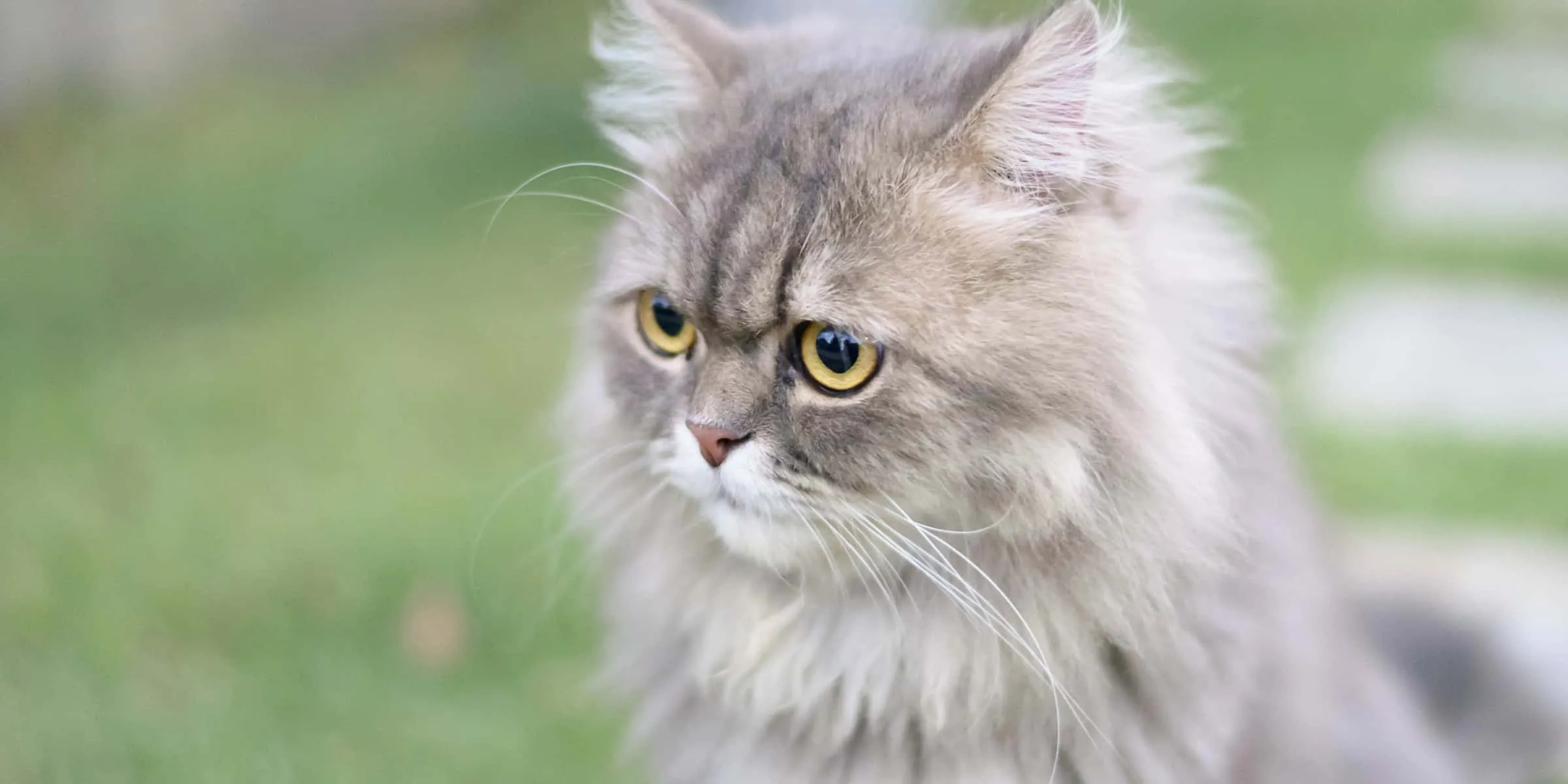The Best Fluffy Pancakes recipe you will fall in love with. Full of tips and tricks to help you make the best pancakes.

As the old adage goes, ‘no man is an island.’This holds true not just for humans, but for animals as well. Just like their human counterparts, pets need social interaction and companionship to thrive.
Persian cats, in particular, are known for their regal and aloof nature, but do not let their appearance fool you. They too crave attention and can experience loneliness.
Persian cats do have a tendency to become lonely and may develop separation anxiety if they are left alone for long periods of time. They are known for being affectionate and thrive on attention from their owners, so it is important to spend quality time with them and provide them with plenty of toys and stimulation when you are not around.
In this article, we will delve into the personality and behavior of Persian cats, their social nature, and the signs of loneliness they exhibit. We will also explore the different factors that contribute to their feelings of isolation and offer ways to prevent loneliness in Persian cats.
By the end of this article, you will have a better understanding of how to create a comfortable and fulfilling environment for your furry friend.
Understanding the Personality and Behavior of Persian Cats
You’ll want to understand the personality and behavior of Persian cats if you’re considering getting one, as they can have specific needs and preferences. Persian cats are known for their laid-back and calm temperament. They’re not as active as other cat breeds and prefer a relaxed environment.
They love to nap and spend most of their day sleeping. One thing to keep in mind is that Persian cats require regular grooming. Their long, thick fur can easily become matted and tangled without proper care. It’s important to brush their fur daily and give them baths every few weeks. Neglecting their grooming needs can cause discomfort and even health issues.
Despite their relaxed nature, Persian cats can still become lonely if left alone for extended periods. They crave attention and affection from their owners. It’s important to spend time with them and provide them with toys and activities to keep them entertained. If you’re not able to spend much time at home, consider getting a second cat or pet to keep them company.
The Social Nature of Persian Cats
As you explore the personality and behavior of Persian cats, it’s important to understand their social nature. These feline companions crave companionship and interaction. They often enjoy being around people and other animals. Evidence suggests that Persian cats thrive in environments that provide them with ample opportunities for socialization and engagement.
Craving Companionship and Interaction
If you’re feeling a bit blue, your Persian cat might be too, as they crave social interaction like a moth to a flame.
Persian cats are known to be social creatures that enjoy spending time with their owners and other pets. In fact, having multiple pets can be greatly beneficial for their well-being and can help prevent the negative effects of loneliness on their behavior.
When left alone for extended periods of time, Persian cats can become anxious, irritable, and even depressed. They may develop behavioral problems such as excessive grooming, scratching, or vocalizing. However, when given plenty of opportunities for social interaction and playtime, Persian cats can thrive and become well-adjusted pets.
As a responsible pet owner, it’s important to provide your Persian cat with plenty of attention, affection, and opportunities for socialization to ensure their happiness and well-being.
Enjoyment of Being Around People and Other Animals
Spending time with their favorite humans and furry friends brings Persian cats immense joy and fulfillment. Socialization plays a crucial role in their overall well-being and happiness.
Persian cats are known for their friendly and affectionate nature, which makes them great companions and perfect for families with children. They thrive on human attention and love to be petted and cuddled.
However, it’s important to note that the social behavior of a Persian cat is also influenced by their breed. They’re not as social as some other breeds and may prefer to spend some time alone. But this doesn’t mean that they don’t enjoy being around people or other animals.
With proper socialization, they can learn to enjoy the company of other pets and humans, which can lead to long-lasting, fulfilling relationships. In conclusion, socialization is crucial for the happiness and well-being of Persian cats, and with proper care, they can become great companions for anyone seeking love and affection.
Signs of Loneliness in Persian Cats
You can easily identify signs of loneliness in your Persian cat by observing their behavior and habits. If your usually sociable pet starts to become more withdrawn and spends longer periods of time hiding or sleeping, this could indicate that they’re feeling lonely. Similarly, if your cat stops showing interest in playing or engaging with toys, this could also be a sign of loneliness.
There are several potential health problems that can arise from a cat being left alone for extended periods of time. One of the most common is obesity, as a lack of stimulation and exercise can lead to overeating and weight gain. Additionally, a lonely cat may become more susceptible to illnesses and infections due to a weakened immune system. If you notice any of these behavioral changes or potential health problems in your Persian cat, it’s important to seek veterinary care as soon as possible.
To prevent loneliness in your Persian cat, it’s important to provide them with plenty of opportunities for socialization and stimulation. This can include setting aside time each day to play with your pet, as well as providing them with toys and scratching posts to keep them entertained while you’re away. You may also want to consider getting a second cat as a companion for your pet, as Persian cats are known to enjoy the company of other felines.
By taking these steps, you can help ensure that your Persian cat remains happy and healthy for years to come.
- Provide your cat with plenty of toys and scratching posts to keep them entertained.
- Set aside time each day to play with your pet.
- Consider getting a second cat as a companion for your Persian.
- Seek veterinary care if you notice any changes in your cat’s behavior or potential health problems.
Factors that Contribute to Loneliness in Persian Cats
When it comes to Persian cats, there are three main factors that can contribute to feelings of loneliness. Firstly, lack of interaction is a major factor that can leave your feline friend feeling isolated and sad.
Secondly, boredom can also contribute to loneliness, as cats require mental stimulation to remain happy and engaged.
Finally, separation anxiety can be a significant cause of loneliness in Persian cats, with some cats becoming distressed when their owners are away for extended periods.
By understanding these factors, you can take steps to ensure your Persian cat remains happy and fulfilled, even when you’re not around.
Lack of Interaction
Neglecting to interact with your Persian cat may lead to feelings of loneliness, causing them to become aloof and distant from you. Persian cats thrive on human interaction and need socialization to stay mentally and emotionally healthy. Lack of interaction can result in behavioral issues such as aggression, depression, and anxiety.
One way to alleviate loneliness in Persian cats is to provide them with interactive toys that stimulate their senses and keep them engaged. Toys such as puzzle feeders, laser pointers, and feather wands can provide mental stimulation and help keep them active.
Another way to combat loneliness is to spend quality time with your cat, playing with them, grooming them, and giving them affection. This interaction not only helps to prevent loneliness but also strengthens the bond between you and your pet.
Ultimately, human interaction is essential for the well-being of Persian cats and shouldn’t be overlooked.
Boredom
Sometimes it’s easy to forget that our furry friends need entertainment too, and boredom can become a real issue for them. Persian cats are no exception.
There are several causes of boredom in Persian cats, including lack of toys, lack of playtime, and lack of mental stimulation. As an owner, it’s important to provide your cat with appropriate toys and playtime to keep them stimulated and engaged.
The importance of mental stimulation for Persian cats can’t be overstated. Without it, they may become lethargic, depressed, and even develop behavioral issues. Providing your cat with interactive toys, scratching posts, and even hiding treats around the house can help keep them mentally stimulated and prevent boredom.
Remember, a happy and engaged cat is a healthy cat, so make sure to prioritize their mental wellbeing.
Separation Anxiety
Separation anxiety can be a common issue for Persian cats as well as other pets. If your Persian cat is showing signs of anxiety when left alone, it’s important to consider the potential causes.
Some common causes of separation anxiety in cats include changes in the household routine, traumatic experiences, or a lack of socialization early in life. To help your Persian cat cope with separation anxiety, there are several strategies you can try.
First, consider gradually increasing the amount of time your cat is left alone to help them adjust. Providing plenty of mental and physical stimulation while you’re away, such as puzzle feeders or interactive toys, can also help distract your cat from their anxiety.
Additionally, creating a safe and comfortable space for your cat to retreat to can help them feel more secure when you’re not around. If your cat’s anxiety is severe, you may want to consider consulting with a veterinarian or animal behaviorist for additional support.
Ways to Prevent Loneliness in Persian Cats
To prevent loneliness in your Persian cat, there are several evidence-based ways you can try. Regular playtime and exercise are crucial to keep your cat active and engaged. Interactive toys and puzzles can also provide mental stimulation and prevent boredom.
Additionally, considering adopting a companion for your cat can provide social interaction and companionship. By implementing these strategies, you can help ensure your Persian cat stays happy and healthy.
Regular Playtime and Exercise
You’ll want to make sure that your beloved Persian kitty gets plenty of playtime and exercise to keep them happy and healthy. Regular exercise and playtime are essential to preventing loneliness in cats.
Persian cats are an indoor breed, so outdoor play may not be an option for them. However, indoor play can be just as beneficial. Benefits of outdoor play include fresh air, sunlight, and the opportunity to explore new scents and sights. However, indoor play can provide similar benefits, such as mental stimulation and physical exercise.
The key is to establish a consistent routine that includes playtime and exercise. This can include interactive toys, such as feather wands and laser pointers, or even homemade obstacle courses. By incorporating playtime and exercise into your Persian cat’s daily routine, you can help prevent loneliness and keep them healthy and happy.
Interactive Toys and Puzzles
Incorporating interactive toys and puzzles into your feline friend’s routine is like giving them a mental gym to flex their brain muscles. These types of toys and games provide a variety of benefits for your cat, including mental stimulation, physical exercise, and stress relief.
Puzzle toys such as treat dispensers, interactive balls, and scratching posts with attached toys can keep your cat entertained for hours while also promoting healthy behaviors. Engaging your cat with playtime is essential for their overall well-being, and interactive toys and puzzles can be an excellent way to do so.
These types of activities not only provide entertainment for your cat but also help them stay active and maintain a healthy weight. Additionally, engaging your cat in playtime can help prevent destructive behavior such as scratching or chewing on furniture.
Overall, incorporating puzzle toys and interactive games into your cat’s routine can have significant benefits for both you and your feline friend.
Consider Adopting a Companion
Thinking about adding a furry friend to your household? Consider adopting a companion for your Persian cat.
Multi-pet households have been shown to provide numerous benefits for both the pets and their owners. With a companion, your Persian cat will have a playmate and a source of comfort, reducing the likelihood of loneliness and boredom.
However, it’s important to choose the right companion for your Persian cat. Not all cats get along with each other, and introducing a new pet to your home can be stressful for your current pet. When selecting a companion, consider their age, personality, and energy level.
It’s best to choose a cat that has a similar temperament and activity level to your Persian cat. Slowly introduce the two cats to each other and give them time to adjust to each other’s presence. With patience and care, your Persian cat can enjoy the benefits of having a loving companion in their life.
Creating a Comfortable Environment for Your Persian Cat
Did you know that Persian cats thrive in comfortable and calming environments? Studies have shown that they exhibit positive behaviors when they have access to cozy hideaways and soft bedding. Creating a cozy space for your Persian cat is essential to ensure their overall well-being and happiness.
Providing stimulating activities is also crucial to keep your Persian cat engaged and entertained. You can offer your cat toys, scratching posts, and interactive games to keep them mentally stimulated. It’s also important to create a routine for your cat and provide them with a comfortable and safe place to rest and relax.
In addition to providing a comfortable environment, it’s essential to spend quality time with your Persian cat. They crave attention, and spending time with them is a great way to bond and strengthen your relationship.
Overall, creating a cozy and stimulating environment for your Persian cat will ensure that they are happy and healthy.
Training and Socializing Your Persian Cat
Training and socializing your Persian cat is crucial for their happiness and well-being, as they thrive on human interaction and affection. Persians are known for their independent nature and may require more effort in training compared to other breeds. However, with the right training techniques and positive reinforcement, they can become well-behaved and social animals.
One effective training technique is to use positive reinforcement, such as treats or verbal praise, when your Persian cat displays good behavior. This can include using a scratching post instead of furniture or using the litter box consistently. Consistency is key when using positive reinforcement, as it reinforces the desired behavior and encourages your cat to repeat it.
Socializing your Persian cat is also important, especially if you have a busy household or other pets. Start by introducing them to new people and animals gradually, and reward them for displaying calm and friendly behavior. This can help prevent anxiety and stress in your cat and promote healthy socialization and behavior.
By investing time and effort into training and socializing your Persian cat, you can help ensure that they lead a happy and fulfilling life.
Can Unfriendliness in Persian Cats Be Linked to Loneliness?
The unfriendliness in Persian cats behavior characteristics may be linked to loneliness. Unlike other breeds, Persian cats are known for their independent nature. They may exhibit standoffish behavior when feeling lonely or neglected. It’s important to provide them with attention and affection to ensure they feel secure and loved.
Conclusion
In conclusion, as a Persian cat owner, you play a crucial role in ensuring your feline friend’s happiness. Understanding their personality and behavior is the first step in preventing loneliness.
Persian cats are social creatures and need interaction and attention from their owners. Signs of loneliness include excessive grooming, lethargy, and decreased appetite. Factors that contribute to loneliness include lack of socialization, inadequate living space, and insufficient playtime.
To prevent loneliness, create a comfortable environment for your cat, provide them with toys and scratching posts, and spend quality time with them. Think of your Persian cat as a delicate flower that needs proper care, attention, and affection to thrive.
With the right approach, your cat can lead a happy and fulfilling life, and you can enjoy a strong and lasting bond with your furry companion.








